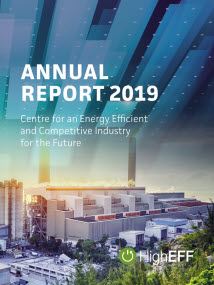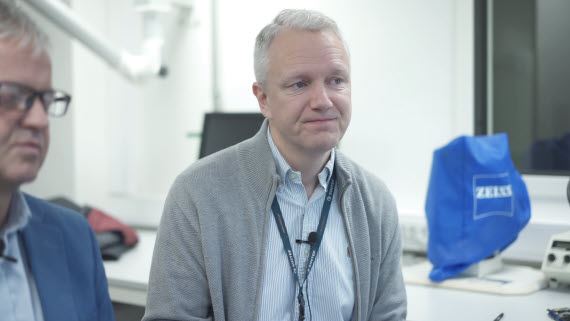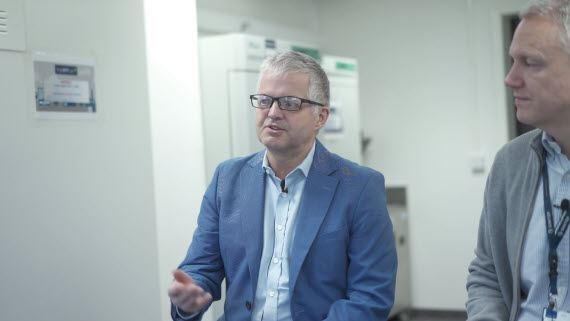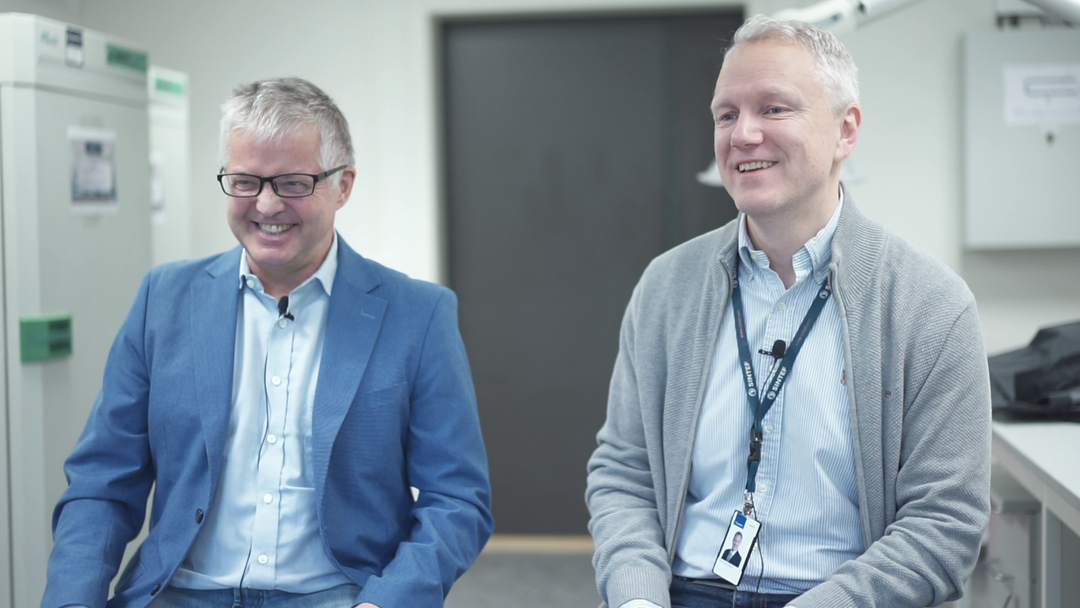In today’s globalized world the pressure of sustainability has a serious impact on society and industry. An important aspect of HighEFF's objective is to increase energy efficiency and reduce greenhouse gas emissions, which is key for industry both in Norway and abroad.

"The collaborative effort between partners is important for ensuring innovations contribute to reduced emissions from industry, while also making industry more energy efficient”, says Arne Ulrik Bindingsbø, Chairman of the HighEFF Executive Board. The Centre collaborates with many partners, such as academia, research institutions and partners from a range of industries including the food processing industry, metals and gas, and minerals, “Together, all these help us to reach our goals”, he adds.
Results from the first four years of HighEFF
During the first four years, the Centre has developed numerous technical solutions and concepts that can be realized in society, but also revealed other issues critical for the implementation of such solutions, such as contractual issues, legal issues and societal acceptance.
“From a technical perspective, HighEFF has worked on several specific projects. One of them is the production processes for heat exchangers, using for instance 3D-printing as a method. Another project focused on industrial heat pumps and how they can produce heat in a more efficient way. Implementation of high temperature heat pumps (HTHP) can potentially reduce emissions and heat demand in industrial processes. As a result of the research and development together with FME HighEFF, TINE has achieved a reduction of 40 percent in the new dairy established outside of Bergen in 2019” says Røkke.

Petter Røkke, Director HighEFF
“We have also done a mapping of ideas that we see as potential innovations. A follow-up on these ideas is highly interesting in terms of detecting innovations that can have a positive impact on the industry. The Centre works with this both on the fundamental side, towards real applications (e.g. piloting) and through a specific work package called Novel Emerging Concepts”, Røkke continues.
Bindingsbø adds that HighEFF’s focus on innovation is already giving great results. Since start-up, 15-20 R&D spin-off projects have evolved out of HighEFF, which directly impacts the industry in terms of value creation. Another contribution has been the initiation of meeting arenas and cross-sector workshops: “This is an eye-opener for us because we can see that one industry using one technology has an effect on other industries as well. This makes the implementation phase between industries more efficient”, says Bindingsbø.
Specific results from 2019
When asked about 2019’s most important highlights, Røkke is quick to mention that they have developed a new method to measure achievements. Fulfilling industry expectations of up to 30 percent reduction in specific energy use requires a methodological approach to our reporting. Comparing data between industries can be challenging, and this approach makes it more manageable.
“Another highlight of 2019 is our approach to innovations in the Centre: The Novel Emerging Concept package” Røkke adds. “We have initiated yearly calls for ideas and "out of the box" thinking that is not strictly specified in any work plan or description. This creates a low threshold for suggestions and creative thinking, which can benefit all parties involved”.
In 2019, the first of the 17 HighEFF PhD candidates finished his studies. “One of our most important missions is to educate professional PhD candidates that can contribute to research and industry in the future. This is one of our proudest achievements of the year. I would also like to add that we have reached a good balance of nationalities and gender, which is very important to us. Involving international students brings lots of knowledge and competence across borders, which benefits Norway and the candidates' respective home countries", says the Chairman.
Bindingsbø and Røkke also highlight the recent cross-sector workshops as proud achievements, in addition to praising enabling partners like Enova and Innovation Norway as observers in the Centre.
Positioning Norway as the leading lighthouse on energy efficiency
It is no secret that the need for good collaborations in the Centre is crucial to achieve such results. In terms of innovation, placing researchers together with industry serves as a good arena for creating value. “Although much of the responsibility in reducing CO2-emissions and increased energy efficiency lies on industry, building knowledge and awareness to the general public so that individuals can improve in their daily lives is just as important for us to reach our goal”, says Bindingsbø.

Arne Ulrik Bindingsbø, Chair HighEFF Excecutive Board
“Communicating what HighEFF achieves, the way we work and how we should work together with industry is highly valuable in order to reduce greenhouse gas emissions and increase energy efficient technologies. It is especially important to position Norway as a leading lighthouse in the field”, he adds.
By becoming a front runner in the field of energy efficiency, Norway seizes the opportunity given by the high international focus on sustainability and greenhouse gas emissions. The Centre is considered an important contributor to this notion. “By giving us license to operate and continuing our mission, there is an enormous opportunity to establish best practice in Norway for energy efficient processes and technological solutions”, says Røkke.
Our expectations for the Centre and further research
“Obviously, the Centre itself has high expectations from the government and funding instruments. On the other hand, our industry partners also have high expectations to us, and we appreciate that. I like having high expectations”, Røkke points out.
To further emphasize that notion, the interaction and involvement between industry and academia is the one asset that makes HighEFF unique. “This asset is crucial for bringing knowledge to the field, which brings up the next level of technological solutions, and helps us reaching our goals. Based on the four last years of research, I think that an even closer interaction together with industry is crucial for realizing ideas and concepts being developed in the Centre. This also includes expectations from us on the educational side, as PhD-candidates are encouraged to use their knowledge to improve society," he adds.
The management team and the Centre as a whole is continuously being challenged by the board. “Targets are easy to establish. However, it is more challenging to reach them. When the HighEFF project started, the board set some tough targets. This makes it important for us to continuously measure how far we have come, and how far we have left ”, says the Chairman.
Future research – making use of the full value chain
“With four years left of the Centre’s life span, we are now aiming to implement technology out in industry. We need to show the results of HighEFF's solutions and further our international collaborations, "says Bindingsbø.
In order to do this, HighEFF must collaborate and exchange knowledge with vendors operating in international markets, so they can transform their technological products and make them more efficient and sustainable. Today, the Centre collaborates with international vendors such as GE, Danfoss and others. When taking the full value chain into consideration, from resource to product, the implementation of technological solutions in Norway also has an impact on technological products developed abroad. This indicates that technology being developed in (or as a result of) HighEFF can have a positive ripple-effect in other industries and nations to increase industry efficiency and reduce operational emissions. "Furthermore, this confirms that research has an enormous impact and contributes to a more sustainable society", Røkke concludes.
Arne Ulrik Bindingsbø
Arne Ulrik Bindingsbø is Chairman of the HighEFF Board. His current position is Leading Researcher, Energy efficiency and CO2 reducing technologies, Research & Technology, in Equinor. Arne Ulrik Bindingsbø earned a PhD in Materials Science from NTH in 1992. He has more than 25 years of R&D experience from the Oil & Gas sector. His focus area is to develop and execute R&D projects within the field of Operations & Maintenance. As the field of O&M consists of many technical disciplines, Bindingsbø is very focused on collaborative innovation to obtain R&D projects that result in industrial implementation. Since 2014 he has held a position as Adjunct Professor, Department of Marine Technology, NTNU.
Petter E. Røkke
Petter E. Røkke is the Centre Director of HighEFF. His current position is Research Director for the Thermal Energy department in SINTEF Energy Research. Petter earned a PhD in Mechanical Engineering from NTNU in 2006. During his career in SINTEF, he has been active within the fields of CCS (CO2 capture and storage), Bioenergy and Industrial Energy Efficiency. Since 2011 he has been within the management group of SINTEF Energy Research, first as Research director for the Electric Power Technology department and since November 2012 for the Thermal energy department. He was chairman of the board for FME CenBio, is currently member of the board for FME Bio4Fuels. Internationally, he is coordinator of the Joint Programme «Energy Efficiency in Industrial Processes» within the European Energy Research Alliance.


